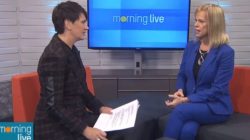November is Financial Literacy Month, and Education Savings week is November 15-21st. A recent survey by Knowledge First Financial, Canada’s largest RESP company with not-for-profit ownership – conducted a new study on the effects of COVID-19 has had on parents planning and saving for their child’s post-secondary education.
Nearly 60% of parents fear that COVID-19 will have a negative impact on preparing their child for post-secondary education.
There are things that both parents and children can do to help get ready for this from a financial perspective; here are my top tips.
Top 10 ‘Parenting Wins’ On Managing Money
- Investigate the actual cost of a post secondary education for your kids. Don’t forget to include books, rent, food, and accommodation, as well as tuition. Program costs can vary institution to institution. Know what you are saving for.
- Create a chore chart or wheel for allowance payouts. Kids can’t earn money any other way. Great way to understand that effort = reward. Each chore equals a different allowance payout. Have the kids spin the chore wheel to see what work they will be doing and how much they will earn that week! Or include a goal (i.e. a video game), and the number of times a certain chore must be performed to reach that goal. For example, shovel the driveway three times, vacuum the living room, do a load of laundry = reward!
- Four out of ten parents report that COVID-19 has had a negative impact on their ability to save for their child’s post secondary education. Create a household budget, and share it with the kids if age appropriate. Use basic explanations of how money comes in, and how it goes out. Work as a family to find ways to save money.
- Play board games that include a money component. Monopoly will teach them about risk, investment, return and rent. The Game of Life or PayDay is great for practicing income versus expense math.
- Did you know that RESPs give government grants? Your savings can grow even faster! Knowledge First Financial is the perfect RESP to open as they are owned by a not-for-profit who reinvest in students through Student Success programs such as Scholarships and Bursaries .
- Let your kids know how much things actually cost. Unless you tell them, they won’t know how much the gas, electricity, food, or other household items take out of your budget. You can also put together a “Wish List” of things they’d like to buy, with the actual prices so they can see what it might take to earn the money to pay for all or part of it themselves.
- 95% of parents believe that saving for their child’s post secondary education is important. Start now. When creating your budget make sure to include a “savings” bucket for long term expenses you know are coming, including your child’s post secondary education. Look at what you can afford to set aside and don’t forget about the government grants that come with RESPs.
- Use a clear savings jar instead of a piggy bank so they can watch their savings grow. Encourage your kids to save their money instead of spending and for every month they save, add a toonie to teach them about interest!
- Talk about ways you can save money in the house as a family. Recycling products, fixing instead of throwing things out, buying second hand, sharing and exchanging with friends.
- Plan for the future with COVID-19 in mind. Create strategies for the different post secondary education deliveries (i.e. online versus on campus) and develop savings plans which will enable your children to succeed. Investments in technology, home offices, versus residence and transportation might play an important role in determining your child’s success.
EXTRA TIPS
- Get them their own bank account so you can help them see how savings build up, and explain about interest.
- Talk to them about how credit cards and loans work, so that they are prepared and understand interest charges should they want or require these when starting post secondary studies.
- Create a chore board that includes the goal (i.e. a video game), and the number of times a certain chore must be performed to reach that goal. For example, shovel the driveway three times, vacuum the living room, do a load of laundry = reward!
- Review the automatic payments coming out of your bank account or being charged to your credit card. Some of them you might not want or need anymore, and that money can go towards saving for your child’s education.








